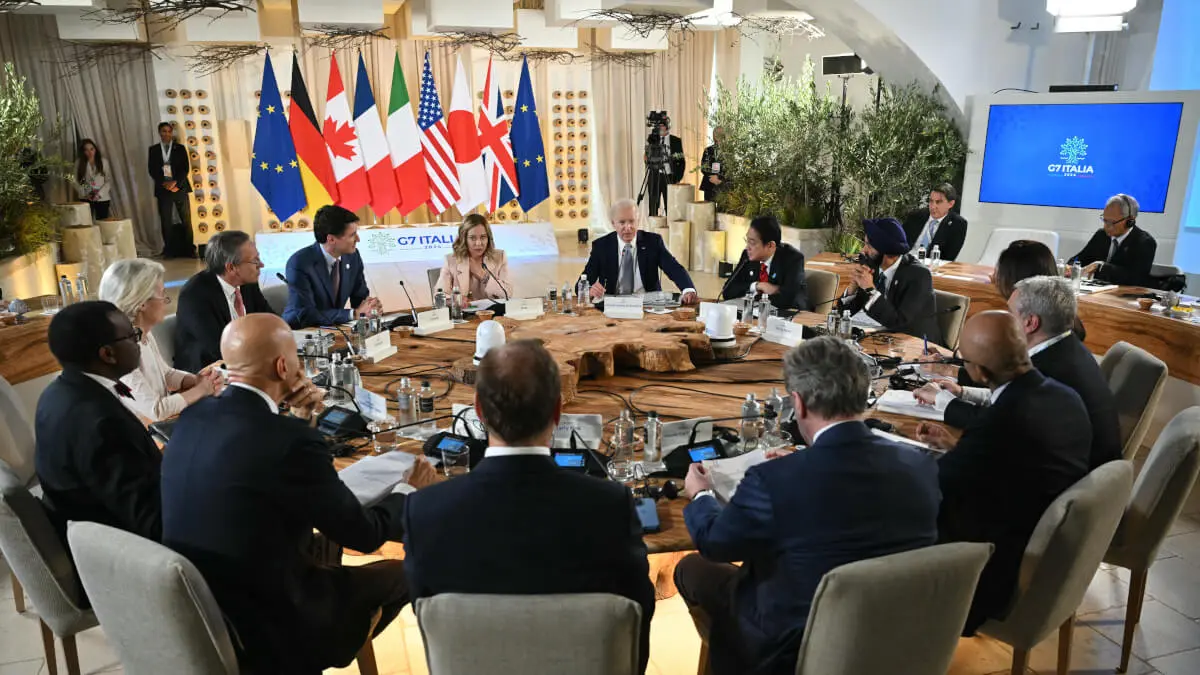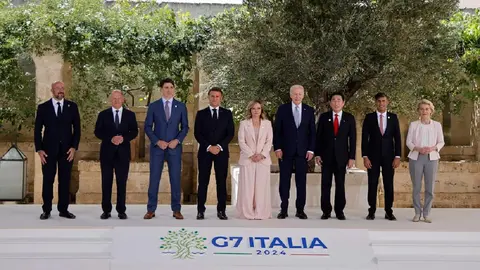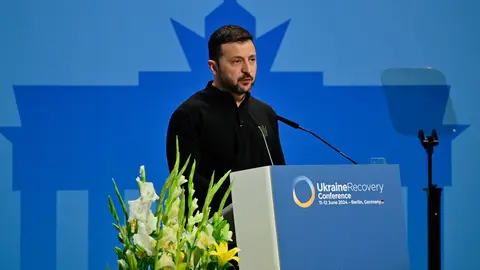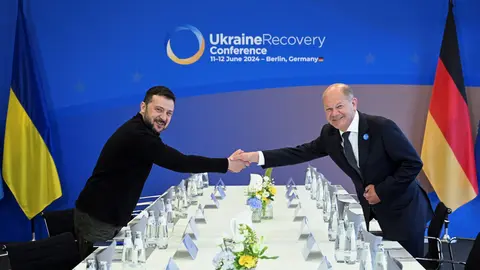G7 agrees to use 50 billion dollars of Russian assets to aid Ukraine

G7 leaders reaffirm their support for Ukraine by agreeing to provide Kiev with $50 billion of frozen Russian assets after the start of the invasion in 2022. This plan is based on a multi-year loan using proceeds from some $300 billion of seized Russian funds, most of which are blocked in the European Union.
US President and Ukraine's main ally, Joe Biden, explained that this decision was another reminder to Putin that they will not back down from defending Kiev.
German Chancellor Olaf Scholz called the agreement "a very clear commitment that should encourage the Ukrainians to do what is necessary to defend their independence and sovereignty".
The aim of this agreement is to guarantee its functioning for years to come, regardless of who is in power in each G7 member state. This point is linked to the possibility that former president Donald Trump will win the US election in November, as he may take a different stance on Ukraine, a source close to the talks told Reuters.
The technical and legal details of the loan are expected to be settled in a few weeks for the funds to reach Kiev later this year. However, a French official told AP, the issue is complicated because if Russian assets are ever unfrozen - for example, when the war ends - the proceeds can no longer be used to repay the loan, requiring a burden-sharing agreement with other countries.
G7 Summit. Clear support for Ukraine, international law, and a just peace.
— Volodymyr Zelenskyy / Володимир Зеленський (@ZelenskyyUa) June 13, 2024
Every day we strengthen our positions and our defense of life.
Every meeting serves the purpose of giving Ukraine new opportunities for victory. I am grateful to all of our partners.
🇪🇺 🇺🇦 🇩🇪 🇨🇦 🇫🇷 🇮🇹… pic.twitter.com/rGtWgqqtM5
Russia has already responded to the decision, calling the West's attempts to gain revenue from its frozen assets "criminal". In the words of foreign ministry spokeswoman Maria Zakharova, "Moscow's response would be very painful for the European Union".
Ukrainian President Volodymyr Zelensky welcomed the decision, assuring that this agreement would be one of many that would be made during the summit in favour of Ukraine.
In turbulent times the strongest message we can send is unity.
— Ursula von der Leyen (@vonderleyen) June 13, 2024
Today the G7 in Bari will show unity.
Unity for Ukraine's freedom. We work on further financial support.
Unity for a peaceful and stable Middle East and the three-phase plan.
Unity on a free and open Indo-Pacific. pic.twitter.com/vCszrXfC3F
Indeed, on the first day of the meeting in Italy, the leaders of the world's leading democracies announced several key security and defence agreements with Kiev.
Biden and Zelensky signed a security agreement, sending a message of unified opposition to Russian President Vladimir Putin and demonstrating the "credibility of US support for Ukraine's independence", the Ukrainian president noted.
🇺🇦🇺🇸 Today is a truly historic day. We signed the strongest agreement between Ukraine and the United States since our independence. pic.twitter.com/z0JM9qEzrh
— Volodymyr Zelenskyy / Володимир Зеленський (@ZelenskyyUa) June 13, 2024
Japanese Prime Minister Kishida Fumio also announced a 10-year partnership in which Tokyo will provide security, defence, humanitarian, reconstruction, technical and financial support to Ukraine.
British President Rishi Sunak has approved up to 242 million pounds (310 million dollars) in non-military aid to Ukraine. London has also announced a new round of sanctions against suppliers of ammunition and aid to the Russian military located in China, Israel, Kyrgyzstan and Turkey.
The UK also claimed to be working against what it called the "shadow fleet", a group of ships used to circumvent G7 sanctions on Russia's oil and natural gas industry. This is "particularly important" for London as taxes on oil production accounted for 31% of Russian government revenues last year.
The second day focuses on competition with China, development in Africa and artificial intelligence
In addition to reiterating support for Ukraine in different areas, during the first day of the summit the G7 leaders also addressed the situation in Africa and the Middle East, backing Washington's efforts to achieve a ceasefire in the Gaza war.
They also expressed concern about the fighting between Israel and Hezbollah and urged Jerusalem to refrain from launching a large-scale offensive in the southern Gaza town of Rafah "in line with its obligations under international law".
Together, G7 nations are stepping up to meet the challenges of our time. pic.twitter.com/gmQt7xCA85
— President Biden (@POTUS) June 13, 2024
Today, the group's leaders are expected to address issues such as migration, artificial intelligence, energy, economic security and the outlook for the Asia-Pacific region.
In this regard, the G7 is expected to express their unanimous concern over China's industrial overcapacity, which they say is distorting global markets, as well as their determination to help African states develop their economies, diplomats told Reuters.
Sui cieli della Puglia le bandiere del Gruppo dei Sette. Grazie al Reparto Attività Sportive di paracadutismo dell’Esercito Italiano per questa emozionante esibizione. #G7Italy pic.twitter.com/BzjGF2e2Os
— Giorgia Meloni (@GiorgiaMeloni) June 14, 2024
The G7 summit is a forum that plays an important role in shaping responses to global challenges, complementing the global economic coordination carried out by the G20. The group consists of the United States, Canada, France, Germany, Italy, Japan and the United Kingdom. The European Union has also been included in recent years, making the measures adopted at the summit politically binding for all members.
This year, the Italian presidency has also invited leaders from 12 other countries, including India, Brazil, Argentina, Turkey, Algeria and Kenya, while Pope Francis will speak on the risks and potential of artificial intelligence.











